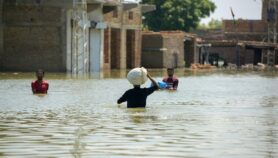By: Yojana Sharma
Send to a friend
The details you provide on this page will not be used to send unsolicited email, and will not be sold to a 3rd party. See privacy policy.
A global alliance of environmental research agencies, policy organisations and international donors will be launched at the Planet Under Pressure conference in London, United Kingdom, later this month (26–29 March).
The ‘Future Earth’ alliance aims to deliver scientific and social science research in a way that policymakers and grassroots groups would understand to help them meet their sustainable development goals in the coming decades.
It will also seek to co-ordinate and focus international scientific research in a wide range of disciplines including ocean acidification, climate change, land use and population growth, and the social impact of these changes.
The research core of Future Earth is comprised of organisations that originally came together as the Earth Systems Sustainability Initiative (ESSI), and include the International Geosphere-Biosphere Programme, the International Human Dimensions Programme on Global Environmental Change, DIVERSITAS — an international programme on biodiversity science — and the World Climate Research Programme, which studies the human influence on climate.
This article is part of our coverage of preparations for Rio+20 — the UN Conference on Sustainable Development — which takes place on 20-22 June 2012. For other articles, go to Science at Rio+20
"We haven’t had a mechanism for looking at the integrated interaction of all the different global environmental changes that are going on," said Mark Stafford Smith, science director of the Climate Adaptation Flagship project at the Commonwealth Scientific and Industrial Research Organisation (CSIRO) in Australia, and co-chair of the London meeting.
"It is not just climate change [that Future Earth will focus on], but changes in the nitrogen cycle, ocean acidification, and others — and also changes to population and consumption, patterns of demographic aging, and a whole host of issues in the economic and equity spheres as well."
Another aim is to strengthen research that benefits developing countries, and to increase the engagement of researchers with global sustainability research, with assistance from the initiative’s donors.
"Some of the current funders are research funders and they would like to get development [aid] funders involved in current efforts on sustainable development," said Gisbert Glaser, senior advisor at the International Council for Science, in France.
"We would also like to break down the barrier that exists between funding for research that involves the global South and funding for development."
A set of four integrated themes for the ten-year initiative will be announced this year, which are expected to include water, energy and food security.
Future Earth is expected to be fully operational by mid-2013, with a dedicated secretariat, but many activities are expected to be in place by the end of this year.
Link to presentation on Future Earth
See below for a video about the Planet Under Pressure conference:
This article is part of our coverage on Science at Rio+20.













